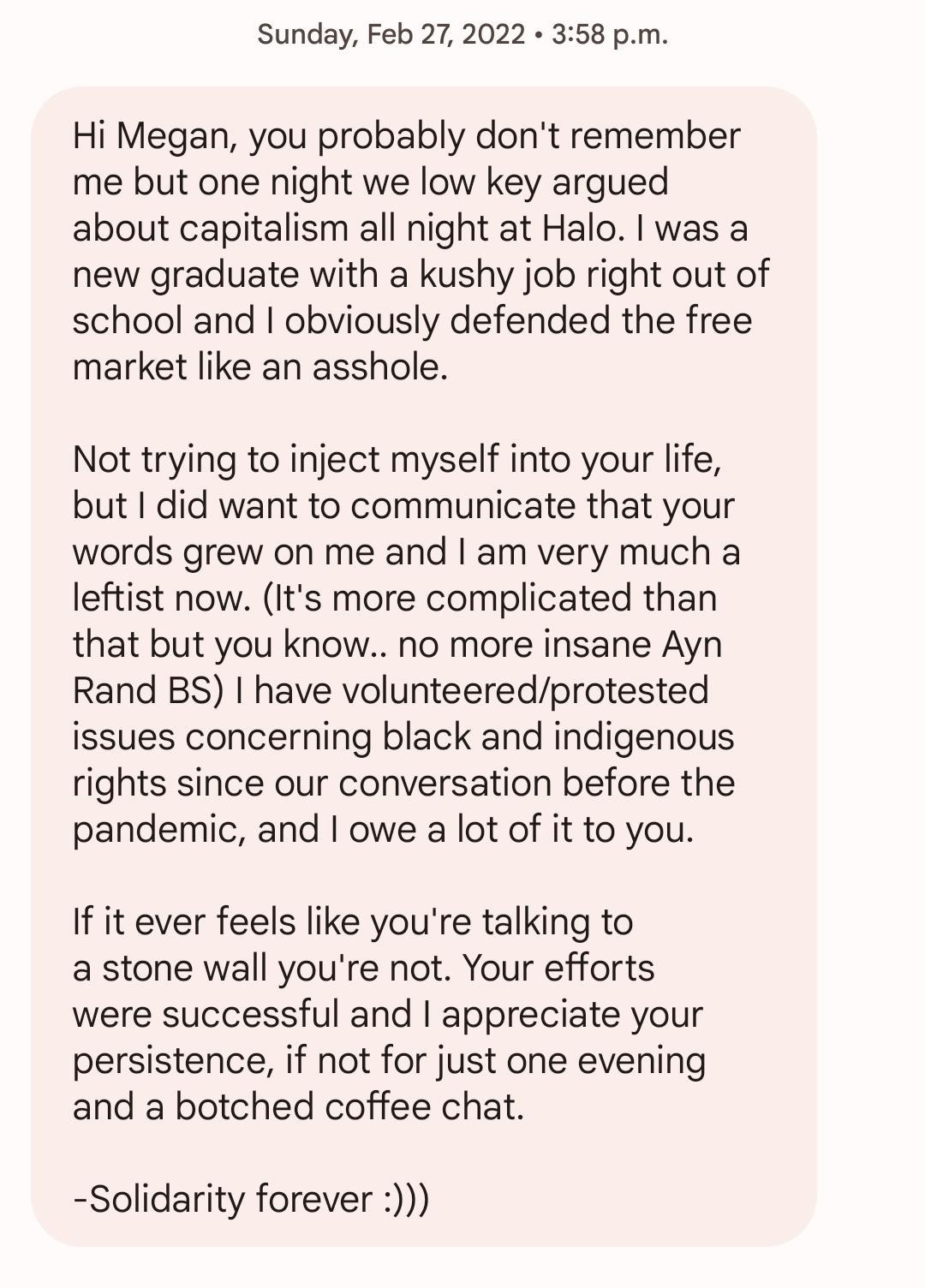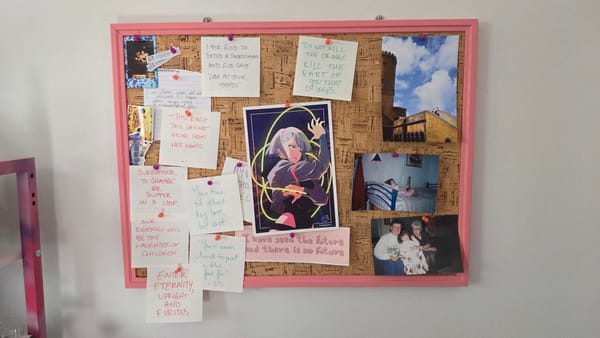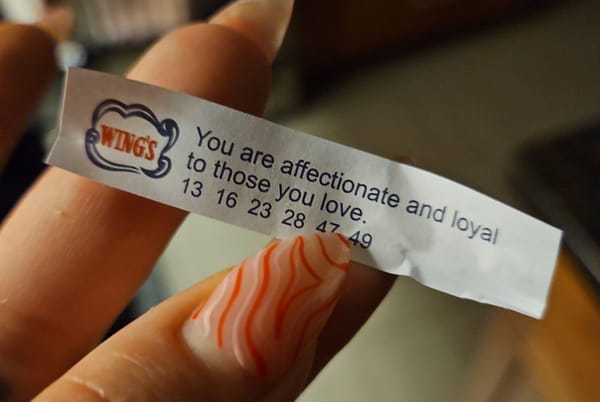Who Among Us Is Immune to Love?
Archived from Jul 27, 2023:
First, a content warning: I will briefly be touching on child trafficking and child abuse this week.
I mean, when I was with the Divine Chain, some of the smartest people there were also the most committed. Intelligence doesn’t make you less prone to taking on bad ideas, it just makes you better at defending them to other people and to yourself. Smart people can believe some truly ridiculous things, and then deploy all the reason and logic at their disposal to justify them, because a belief doesn’t begin in your mind. It begins in your feelings.
- MAG 153, Love Bombing, The Magnus Archives
I have been reading and listening to the work of Robert Evans since I was in high school and he was still writing for cracked.com; I even cited him extensively in my master’s thesis. One of the things he has come to cover a lot as a journalist is the alt-right and by extension, conspiracy theories and cults. One of the things he has always been adamant about is that we all have our thing. It’s easy to read sensationalized news stories about raids and mass graves that the more extreme cults result in and think to ourselves that we are surely too rational, too clever and forthright to fall for such extreme views and, frequently, such absurdity. Would we not all turn and leave at the mention of aliens, reptilians or god infested mountains? For the most part, short news stories only tell the end of the cult, whereas they usually start, especially individually, around loneliness, affection and community. People who feel isolated, constantly challenged, inferior, or any number of stressful emotions are susceptible. The issue then arises when these are foundational human experiences, meaning everyone, under the correct pressure and circumstance, has something that would make them tick just right.
Everyone is influenced and persuaded daily in various ways, but the vulnerability to influence varies. The ability to fend off persuaders is reduced when one is rushed, stressed, uncertain, lonely, indifferent, uninformed, distracted, or fatigued.”
- Margaret Singer, Clinical Psychologist
For the most part, these very natural stressors and blended with the right charismatic character can drive seemingly regular people to very extreme ends. One very common way of bringing people in to a cult is called love bombing. Assuring lonely, stressed out people that they belong, that they are loved and needed. Of course, this never lasts, as it is never rooted in any actual love, but rather a desire to be worshipped, to be obeyed. Once the initial feelings have been laid is when the more menacing teachings and rituals start to bleed into what the members are taught. To illustrate: the sarin gas attack of 1995 carried out by the Aum Shinrikyo cult in Tokyo. When the sarin was released in the subway, 14 people died and over 1000 suffered nonfatal injuries, many of whom were disabled by the attack. Though the cult did have some international membership, it was largely comprised of young, successful Japanese students and recent graduates who had been raised under a stressful, work focused culture. For more on this, I recommend Haruki Murakami’s Underground, in which he interviews survivors and carefully, mindfully builds a timeline of the terrifying day. What I use this example to illustrate is that status, country, history or intellect is not enough to stop indoctrination. A more mainstream example would be Scientology. Known for it’s extremely famous members and very litigious legal team, it is a powerful, almost impenetrable group. Cults have been well documented for a long time, as well as the deprogramming carried out when people leave. Yet, I find some of this a little less explanatory for more modern, digital cults.
From here, I’m going to spitball a bit based on the journalists I pay attention to who write about modern, particularly digital conspiracies. These include the aforementioned Robert Evans, Julian Feeld, Jake Hanrahan, Alice Marwick and many others. Now, none of this is to imply that traditional cults no longer exist, they absolutely do. As a matter of fact, Aum rebranded as Aleph a few years after going underground and still seems to have some active, albeit not publicly violent, members. Rather, there is a layer that digital cults have that doesn’t seem to reflect their predecessors. First, especially in the most prominent digital first cult, QAnon, there is no clear leader. There have been some offshoots of Q that have landed in the real world; did you hear JFK Jr. is back? What this means is that the massive, incomprehensible algorithms of Twitter (now X, whatever Elon), Facebook and other social media platforms more popular on the fringes, have almost as much say in which theories make it to the forefront as the conspiracy du jour as believers do. Members, if you can even call them that, are encouraged to “do their own research”, or colloquially “bake” the “crumbs” they find online. I know you, dear reader, know how ridiculous this sounds. This lack of a central figure, the theories in constant flux begins to undermine the standard idea of community that used to be, by their very nature, attached to cults. People sought community and acceptance, whereas with Q, the community is tenuous at best. Members are constantly under threat of being exiled, accused of any number of things or simply being outpaced by how quickly the theories change. While there are some live events, for the most part, members are realistically isolated from one another. For any meaningful number of them to meet in real life, they need to organize and travel to infrequent, conference style events. This lack of community is indicative of something else that seems to be very common in these digital conspiracies, which is hyper individualism. The encouragement to “do your own research” keeps members siloed, even though they are in the same “group”, constantly trying to one up and out do the others with the most outrageous theory. There is little “we believe” and largely “I believe”. This leads to incredible cognitive dissonance and incomprehensible conversations to those outside the group. Not only is each individual is encourage to come to their own conclusion, but to constantly change those conclusions to whatever suits their immediate world view. There is no shortage of videos online of conspiracy addled folks being confronted with their own hypocrisy and not even realising it. There is something that strikes me as very, very cowardly and selfish about how these people talk about the world. The world is a disaster. Inflation, housing crisis’, mass unemployment, climate change, the list goes on. These people experience the same stress as the rest of us, and come to the conclusion that a series of extremely powerful people are in control of everything and making choices that only benefit themselves. So far, so good. The reason I use the words selfish and cowardly is because rather than accept that the people who gloat about their wealth and control are, indeed, those in power, they weave fantasies in which they are the only one who really understand what’s going on; they create narratives fit for a poorly written movie so that they feel as though they alone can “see through the matrix”. This is blatantly self involved and individualistic, and I believe cowardly because the fantasy eschews any responsibility to actually do anything. When the “they” that controls everything is some undefinable cabal, it becomes materially unrealistic to do much other than fester on message boards together. Not only is this cowardly, it also harms actual efforts to alleviate pain in people’s lives. One of the most upsetting examples of this is the #savethechildren frenzy from last two years. Child trafficking is horrible, child abuse is wholly inexcusable and vile, any remotely decent human being would agree with that and, by extension, see nothing wrong with the statement of “save the children”. The issue arises when the phrase is coopted by a group who believe there are secret tunnels full of children under New York where the aforementioned evil cabal harvests adrenochrome (I will spare you explaining that conspiracy in depth). What happens when these things are coopted are two fold: first, people who do believe in the sentiment see outlandish conspiracies and start to take the issue less seriously and second, real world efforts to help victims of human trafficking are undermined and have reduced visibility. These palatable, easy to agree with statements are the QAnon equivalent of love bombing. A guarantee of people who believe in the importance of keeping children safe is a very easy opening to the pipeline of more radical beliefs. A desire to be special, to be the one in the know, to be morally correct with little to no actual effort needed. It bums me out.
I want to be clear, not all of this is so incoherent and unintentional. Deliberate decentralization has been a core tactic of modern white supremascists for a long time. Every time you see a white supremacist mass shooter referred to as a “lone wolf”, that is exactly what they want you to think and what they want the media to report. Decentralized cells with the same end goal of spreading hatred, violence, racism and antisemitism is an intentional structure that they have been carrying out for a long time, at least since the 90s, and the lone wolf narrative serves as plausible deniability for the rest of the group. But that’s a paper for another day.
All of this to say that it is community and humility that make us most resilient against conspiracies and extremism. To believe you are inherently above others will not make you more tenacious, but rather will contribute to a culture of isolation and stress that drives people to believe harmful things. We are all stressed, we are all under the pressure created by a handful of people who run things for nothing other than their own immediate benefit, livable planet be damned. It is completely OK to be angered by these conspiracies, to find them outlandish, exhausting and not worth your time, but fundamentally, all deprogramming happens when people feel supported, cared for and loved. Not everyone is equipped for these conversations, and I fully understand that, but it takes all of us to make the world more loving, more community oriented and caring. Sometimes this is as simple as volunteering, donating and being there for your community, other times it comes as more direct advocacy and standing up for the dignity and rights of everyone. The more we support one another, the stronger and safer we will all be.

Thank you, as ever, for being here, friends. I think I’m going to move to a slightly later publishing hour, though that just may be the Toronto heatwave talking right now. This one took a little longer to get my thoughts in order than usual. Now, if you will excuse me I am going to lay directly in front of my air conditioner until I need to write next week's newsletter. Stay hydrated, friends!





